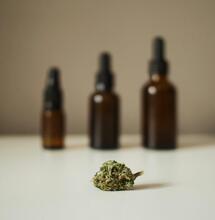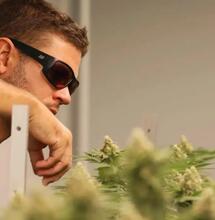Can you use Cannabis and Prescription Medication?

If you consume cannabis, there are distinct medication interactions that you should be aware of. Although many of these conceivable interactions can be dangerous, in some cases, cannabis can replace addictive prescription drugs altogether.
Here are some potential interactions that you should be aware of.
A medication interaction, known as a contraindication in clinical terms, occurs when a person takes two or more incompatible medicines together. Negative medication interactions can cause severe reactions that may be life-threatening. This is why it is crucial to confer with your doctor before using medicinal cannabis alongside your prescription medication.
Grapefruit Danger!
You may have seen a warning about mixing grapefruit and prescription medication and wondered why that is.
The liver is vital to drug interactions—liver enzymes, especially CYP3A4, help to metabolise and eradicate medical marijuana and other drugs from the body's system.
Apart from their filtering properties, CYP enzymes are the biggest culprits in creating drug interactions with cannabis. Cannabidiol (CBD) is a CYP3A4 inhibitor, just like grapefruit juice, so we get the "grapefruit effect."
Cannabis and over-the-counter pain meds.
Over-the-counter (OTC) medications containing acetaminophen may increase the risk of liver damage when used with cannabis on rare occasions. Additionally, non-steroidal anti-inflammatory drugs (NSAIDs) can interact negatively with cannabis, leading to nervous system damage, potential meningitis and an increased risk of bleeding.
More positively, cannabis may be used to reduce the intake of OTC pain meds. Thankfully there was very little interaction between cannabis and most forms of non-opioid OTC pain medications.
Psychiatric Medication
Anxiety and depression are two common conditions that medicinal cannabis users look to treat.
The NHS points out that cannabis can interact with psychiatric medications. Interactions are specifically reported with tricyclic antidepressants (TCAs), including Amitriptyline, Imipramine, and Dothiepin. There is still insufficient research on possible drug reactions with antidepressants of the SSRI (Selective Serotonin Reuptake Inhibitor) family.
Users may experience an increased heartbeat (tachycardia) or a spike in blood pressure. There is a risk that cannabis can interact with tricyclic antidepressants, resulting in confusion, restlessness, hallucinations and mood swings.
It is currently understood that CBD and THC interactions with Lithium, used to treat bipolar disorder, appear benign. However, whether CBD or THC is safe with Lithium is still unclear.
Antibiotics
There is no concrete evidence to say if cannabis interferes with antibiotics positively or negatively. However, you should always notify your doctor if you are about to start a course.
Immunosuppressants
CBD is a natural immunosuppressant, so those using other immunosuppressant steroids, like Prednisone, an anti-rejection tablet taken by those after organ transplants, should always ask their doctor about any possible harmful or positive interactions. CBD may benefit kidney transplant patients. However, more research is still required.
Opioids
THC attaches to CB1 receptors and causes a psychoactive effect in many of the same brain areas as opioid receptors. Cannabinoid receptors can "talk" to opioid receptors influencing how they signal pain. This is why cannabis can reduce painkiller intake and must be tapered off to minimise any chance of a synergistic effect and overdose. It has been proven that interactions exist between codeine, hydrocodone, fentanyl, and cannabis.
Blood Thinners
These are prescribed to treat and prevent blood clots, and Warfarin can become too effective if they interact with THC and CBD. THC and CBD interactions with the CYP2C9 enzyme raise levels of Warfarin, causing excessive bleeding. You should avoid cannabis entirely if you are taking blood thinners.
Bronchodilators
People with respiratory illness treated with Theophylline should beware of possible drug interactions with cannabis. Smoking cannabis speeds up the liver's cleansing of Theophylline and weakens the drug's effectiveness.
Contrarily, cannabinoids like THC and terpenes like pinene have bronchodilatory beneficial effects for patients suffering from respiratory problems.
Anticonvulsants
Multipurpose anticonvulsants are prescribed to treat seizures and to even out manic episodes of bipolar disorder and migraines. Research suggests that taking cannabis with anticonvulsants is not advisable.
Sedatives
Some sedatives will conflict with cannabis, but others may be able to be tweaked to work with the plant.
Clobazam, for instance, is a sedative that minimises seizures caused by a severe form of childhood epilepsy called Lennox-Gastaut Syndrome (LGS). CBD has been found to interact with Clobazam, increasing its effects. However, opinions are divided, with some experts advising against using Clobazam and cannabis together.
The takeaway message is to always check with a medical professional before starting cannabis and prescription medication together.
More on this topic from Soft Secrets:
Medical and recreational cannabis, what the difference?







